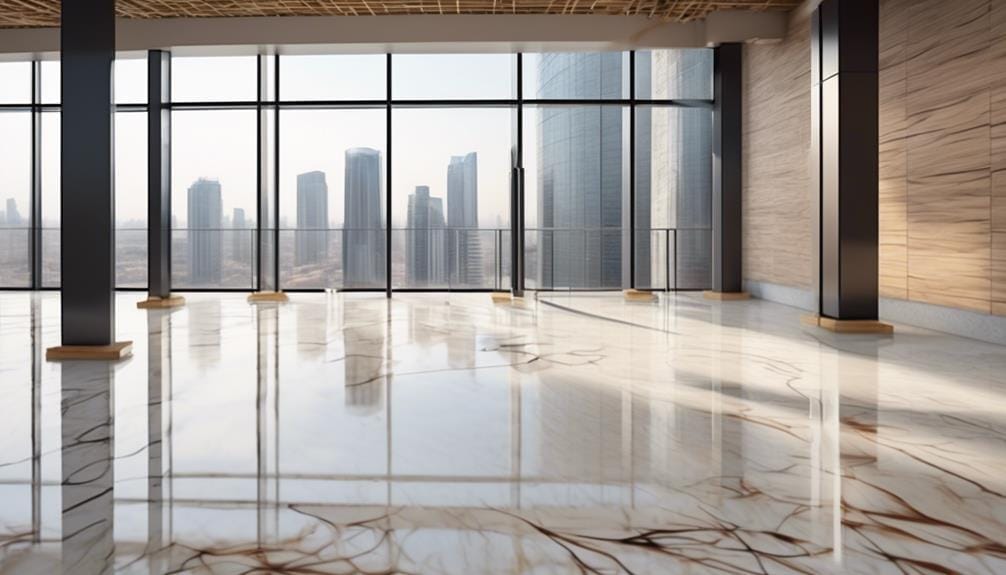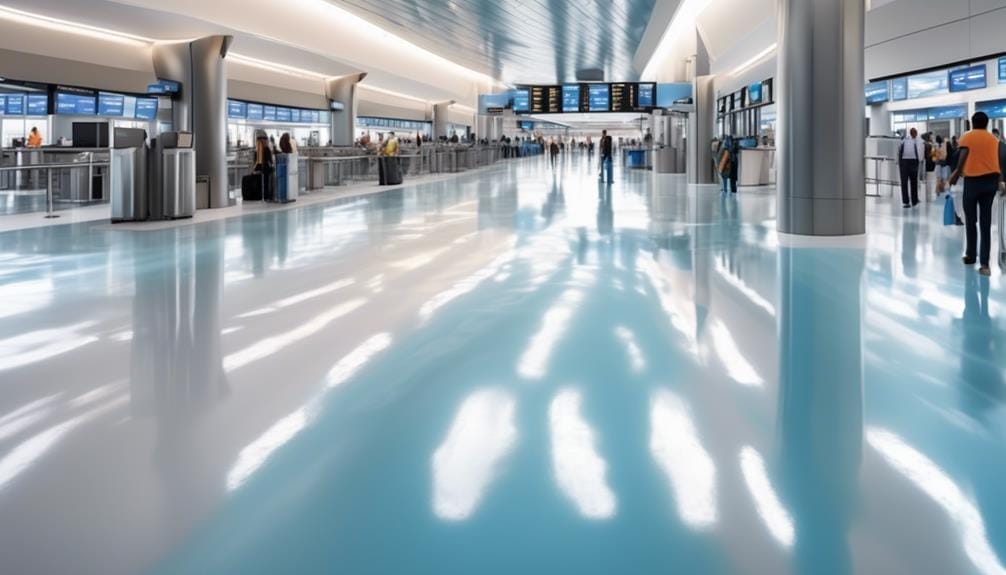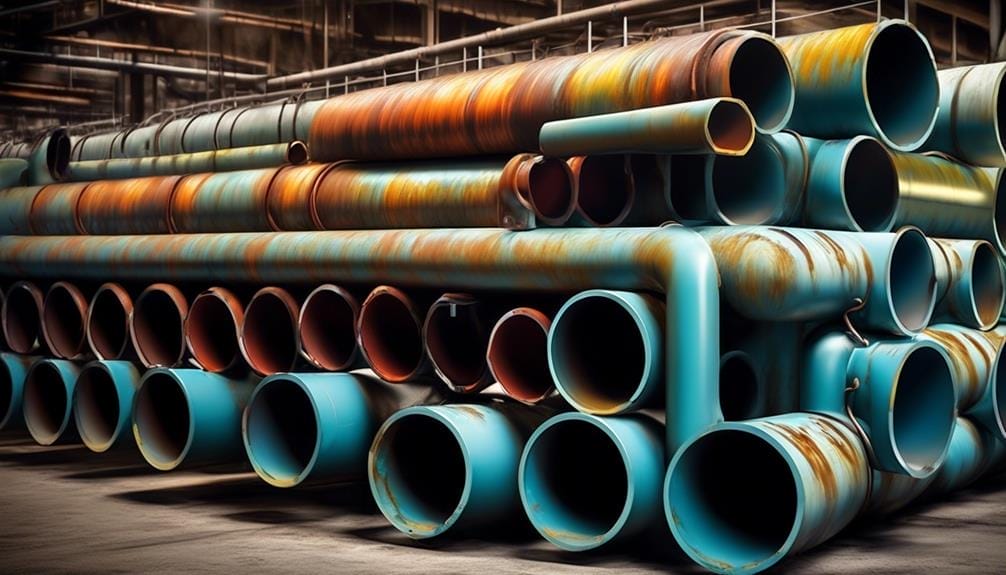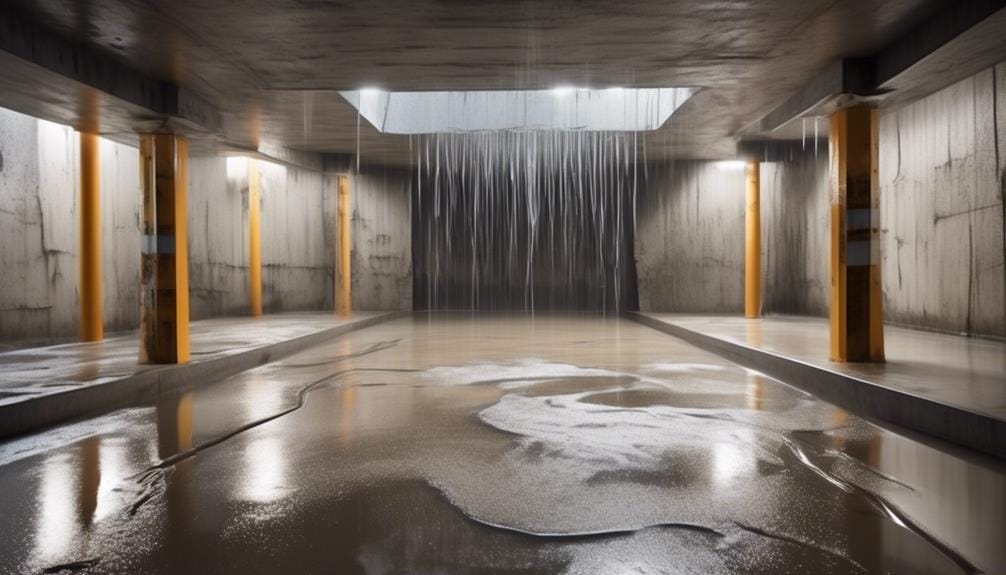Did you know that epoxy is used in approximately 80% of all construction projects? It's true! Epoxy plays a vital role in the construction industry, offering a wide range of applications and benefits.
From enhancing the durability of concrete to providing long-term protection against corrosion, epoxy is a versatile and reliable choice for various construction needs.
But what makes epoxy so indispensable? How does it contribute to creating strong and long-lasting structures? In this discussion, we will explore the importance of epoxy in construction and delve into its many uses and advantages.
So, let's dive into the world of epoxy and discover how it can revolutionize your next construction project.
Key Takeaways
- Epoxy is widely used in construction projects due to its durability, structural enhancement, and protective properties.
- Epoxy coatings and repairs offer high bond strength, extending the lifespan of concrete structures and reducing maintenance needs.
- Epoxy provides a strong bond between different materials and acts as a barrier against corrosion of steel reinforcement.
- Epoxy flooring solutions are resistant to moisture, chemicals, and stains, making them a popular choice for industrial and commercial applications.
Importance of Epoxy in Construction
Epoxy plays a critical role in construction, enhancing the durability and structural integrity of concrete through its adhesive, coating, repair, and bonding properties. One of the key applications of epoxy in construction is its use as a coating material. Epoxy coatings provide a protective layer on the surface of concrete structures, preventing corrosion of the steel reinforcement embedded within. This is particularly important in environments where the concrete is exposed to harsh conditions, such as coastal areas or industrial settings.
By acting as a barrier, epoxy coatings extend the lifespan of concrete structures and reduce the need for frequent maintenance. The corrosion resistance offered by epoxy coatings also minimizes the risk of structural failures, ensuring the safety of the building. Additionally, epoxy resins can mitigate the effects of cracks on corrosion initiation in concrete. This improves the overall durability of the structure and reduces the maintenance needs over time.
Furthermore, epoxy repairs offer high bond strength, structural restoration, and resistance to environmental factors. They provide cost-effective solutions for concrete rehabilitation, allowing for the repair and restoration of damaged or deteriorated structures. Proper surface preparation, temperature, mixing, and application are crucial considerations for successful epoxy use in construction projects. Adhering to these guidelines ensures that the epoxy coating or repair material performs optimally and maximizes the longevity of the structure.
Durability of Epoxy in Building Projects
When it comes to the durability of epoxy in building projects, two key points stand out: longevity and strength.
Epoxy coatings provide long-term protection against corrosion, extending the lifespan of concrete structures. Additionally, epoxy repair materials offer high bond strength, restoring structural integrity and providing excellent resistance to chemicals and environmental factors.
These qualities make epoxy a versatile and reliable choice for various construction and home improvement projects.
Longevity of Epoxy
How can epoxy coatings enhance the durability and lifespan of building projects? Epoxy coatings are known for their ability to provide long-term protection and extend the lifespan of concrete structures. By penetrating into cracks and sealing them, epoxy resins can mitigate the effects of cracks on corrosion initiation, improving durability and reducing maintenance needs. Epoxy repair materials offer high bond strength to concrete substrates, restoring structural integrity to damaged elements. They also provide excellent resistance to chemicals and environmental factors, further enhancing the longevity of building projects. Proper surface preparation, temperature, and mixing ratio are crucial considerations for the successful application of epoxy in concrete, as these factors impact its performance and durability. The following table summarizes the key benefits of epoxy coatings in terms of longevity:
| Benefits of Epoxy Coatings for Longevity |
|---|
| Long-term protection |
| Mitigation of crack effects on corrosion |
| High bond strength |
| Resistance to chemicals and environment |
| Improved durability |
Epoxy resins are versatile and can be utilized in various forms such as coatings, repair materials, grouts, bonding agents, and paints, making them an invaluable asset in enhancing the durability and longevity of building projects.
Strength of Epoxy
By harnessing its high bond strength and durability as an adhesive, epoxy proves to be an invaluable asset in enhancing the longevity of building projects. The strength of epoxy is evident in its ability to provide a strong bond between different materials, such as concrete and steel reinforcement. This high bond strength ensures that the structural integrity of the building is maintained, even under heavy loads and extreme conditions.
Additionally, epoxy coatings act as a barrier, effectively preventing corrosion of steel reinforcement in concrete structures. This not only extends the lifespan of the building but also reduces maintenance costs.
Epoxy repair materials further demonstrate the strength of epoxy, offering high bond strength and excellent resistance to chemicals and environmental factors. When used correctly, epoxy can significantly enhance the strength and durability of building projects, ensuring their long-term stability.
Versatility of Epoxy in Construction Applications

Epoxy's versatility in construction applications is evident through its utilization as an adhesive for bonding concrete and its various forms such as coatings, repair materials, grouts, bonding agents, and paints.
Here are some key examples of how epoxy demonstrates its versatility in construction:
- Coatings: Epoxy coatings are widely used to prevent corrosion of steel reinforcement in concrete structures, extending their lifespan and reducing maintenance costs.
- Repair Materials: Epoxy repair materials offer high bond strength to concrete substrates, restoring structural integrity, and providing resistance to chemicals and environmental factors.
- Grouts: Epoxy grouts are used to fill voids, anchor bolts, and provide structural support, offering excellent load transfer and vibration resistance.
- Bonding Agents: Epoxy bonding agents enhance the bond between new and existing concrete, ensuring a strong connection and preventing delamination.
The versatility of epoxy in construction applications is further amplified through its ability to enhance durability, mitigate cracking effects, and reduce maintenance needs. However, it's crucial to follow proper surface preparation, adhere to mixing ratios, and follow manufacturer guidelines for successful epoxy application.
With its wide range of applications and benefits, epoxy proves to be a valuable asset in the construction industry, providing strength, protection, and longevity to various structures.
Epoxy Coatings for Strong and Long-Lasting Structures
When it comes to creating strong and long-lasting structures, epoxy coatings are an excellent choice. The durability of epoxy is one of its key advantages, as it provides a protective barrier against corrosive agents like oxygen, moisture, and chloride, effectively preventing corrosion and extending the lifespan of concrete.
Additionally, epoxy coatings can mitigate the effects of cracks by sealing them, preventing the ingress of corrosive agents, and improving the overall durability of concrete structures.
Durability of Epoxy
Epoxy coatings provide long-term protection and significantly extend the lifespan of concrete structures, effectively preventing corrosion by isolating steel reinforcement from oxygen, moisture, and chloride. This durability of epoxy is further enhanced by its chemical resistance properties. Here are some key points to consider:
- Epoxy resins can penetrate and seal cracks in concrete, preventing the ingress of corrosive agents and mitigating the effects of cracks on corrosion initiation.
- Epoxy repair materials offer high bond strength to concrete substrates, restoring structural integrity and providing excellent resistance to chemicals and environmental factors.
- Proper surface preparation, temperature and humidity considerations, and following manufacturer guidelines are crucial for successful epoxy application in concrete, ensuring optimal performance.
- Epoxy resins are utilized in building and construction applications due to their heat and chemical resistance, making them more durable than regular glues.
Benefits of Epoxy
To achieve strong and long-lasting structures, epoxy coatings provide exceptional protection by isolating steel reinforcement from corrosion-causing elements and extending the lifespan of concrete. But the benefits of epoxy go beyond corrosion protection. Here are some key advantages of using epoxy in construction:
| Benefits of Epoxy | |
|---|---|
| Improved Durability | Epoxy resins can penetrate and seal cracks in concrete, enhancing its durability and reducing the need for frequent maintenance. |
| Restored Structural Integrity | Epoxy repairs offer high bond strength, effectively restoring the structural integrity of damaged concrete elements. |
| Chemical and Environmental Resistance | Epoxy coatings provide excellent resistance to chemicals, UV rays, abrasion, and extreme temperatures, making them suitable for various environments. |
| Versatile Applications | Epoxy resins are used not only for coatings, but also for outdoor applications, countertops, water-based paints, and in manufacturing processes. |
Applications of Epoxy
With its exceptional protection against corrosion and ability to enhance durability, epoxy coatings find extensive applications in the construction industry for creating strong and long-lasting structures. Here are some key applications of epoxy in construction:
- Epoxy coatings are commonly used to prevent corrosion of steel in concrete structures, providing long-term protection and reducing maintenance costs.
- Epoxy resins can penetrate and seal cracks in concrete, improving durability and mitigating the effects of cracks on corrosion initiation.
- Epoxy repair materials offer high bond strength and restore structural integrity in damaged concrete elements, while also providing excellent resistance to chemicals and environmental factors.
- Epoxy grouts and bonding agents are used to enhance the strength and durability of concrete structures, ensuring their longevity and performance.
Epoxy as a Concrete Repair Solution
When considering concrete repair solutions, one versatile and effective material that should be taken into consideration is epoxy. Epoxy has gained popularity as a concrete repair solution due to its ability to restore structural integrity, provide high bond strength, and offer resistance to chemicals and environmental factors.
Epoxy is commonly used as an adhesive for bonding concrete and as a repair material for cracks and damaged concrete surfaces. It can penetrate into cracks and seal them, improving the durability of concrete structures by mitigating the effects of cracks on corrosion initiation. This makes epoxy a cost-effective solution for concrete rehabilitation, as it extends the lifespan of the concrete and reduces maintenance costs.
In addition to its repair properties, epoxy coatings are applied to concrete structures to prevent corrosion of steel reinforcement. By forming a protective barrier, epoxy coatings enhance the longevity of the concrete and reduce the risk of structural damage.
To ensure successful epoxy application in concrete repair, proper surface preparation, temperature control, and mixing are crucial. Adequate cleaning and preparation of the concrete surface, along with following manufacturer guidelines, will help achieve optimal results.
Epoxy Flooring Solutions for High-Traffic Areas

As we shift our focus to epoxy flooring solutions for high-traffic areas, let's explore the exceptional durability and wear resistance that make them the ideal choice for industrial and commercial spaces. These flooring solutions are specifically designed to withstand heavy foot traffic, vehicle traffic, and frequent use without deteriorating, ensuring long-lasting performance.
Here are some key advantages of epoxy flooring solutions for high-traffic areas:
- Seamless and non-porous: Epoxy flooring provides a seamless surface that's resistant to moisture, chemicals, and stains. Its non-porous nature makes it easy to clean and maintain, making it suitable for environments that require high hygiene standards.
- Chemical and impact resistance: Epoxy flooring is highly resistant to chemicals, making it an excellent choice for areas prone to spills and potential damage. It also offers exceptional impact resistance, making it suitable for spaces with heavy machinery and equipment.
- Customizable safety features: Epoxy flooring solutions for high-traffic areas can be customized with anti-slip additives to enhance safety and prevent accidents in busy environments. This feature is especially important in industrial and commercial spaces where the risk of slips and falls is high.
- Long-lasting performance: With their exceptional durability and wear resistance, epoxy flooring solutions for high-traffic areas ensure long-lasting performance. They can withstand the demands of constant use and heavy traffic, providing a reliable and cost-effective flooring solution.
Bonding Materials With Epoxy Adhesives
Epoxy adhesives play a crucial role in construction projects by effectively bonding materials together, ensuring the longevity and durability of concrete structures. These adhesives are formed by the reaction of epoxy resin and hardener, and they find extensive applications in bonding concrete in construction projects. Epoxy resins are versatile and can be used as coatings, repair materials, grouts, bonding agents, and paints in concrete construction and repair.
One of the significant benefits of bonding materials with epoxy adhesives is the prevention of corrosion in concrete structures. Epoxy adhesives isolate steel reinforcement from oxygen, moisture, and chloride, thus extending the lifespan of concrete and preventing corrosion. Moreover, epoxy resins can mitigate the effects of cracks on corrosion initiation in concrete structures. They penetrate into cracks and seal them, enhancing durability and reducing the need for maintenance.
To ensure effective bonding with epoxy adhesives, proper surface preparation is crucial. It's essential to adhere to temperature and humidity guidelines, use the correct mixing ratios, and follow the manufacturer's guidelines. These measures guarantee optimum adhesion and the desired performance of the epoxy adhesive.
Benefits of Epoxy in Resisting Chemicals

Epoxy coatings offer exceptional resistance to chemicals, ensuring long-term protection for concrete structures. Here are the benefits of using epoxy in resisting chemicals:
- Corrosion prevention: Epoxy coatings act as a barrier, isolating steel reinforcement from oxygen, moisture, and chloride. This prevents corrosion and extends the lifespan of the concrete structure.
- Crack sealing: Epoxy resins can penetrate and seal cracks in concrete, preventing the ingress of corrosive agents. By sealing the cracks, epoxy improves the durability of the structure and enhances its resistance to chemical attacks.
- High bond strength: Epoxy repair materials offer excellent bond strength, ensuring the restoration of structural integrity. These materials adhere strongly to the concrete substrate, providing reliable protection against chemical exposures.
- Environmental resistance: Epoxy coatings exhibit excellent resistance to chemicals and environmental factors. They can withstand harsh conditions, including exposure to acids, alkalis, solvents, and oils. This makes epoxy coatings ideal for industrial environments where chemical spills or exposure is common.
To ensure optimal performance in resisting chemicals, it's crucial to follow proper surface preparation, temperature, and mixing procedures during epoxy application.
Epoxy's Role in Creating Seamless Finishes
Epoxy plays a crucial role in creating smooth and durable surfaces, offering seamless and polished finishes in construction projects.
By providing a protective layer that's resistant to wear, chemicals, and staining, epoxy enhances both the aesthetics and functionality of the surfaces.
Whether it's for floors, countertops, or walls, the application of epoxy ensures a seamless finish that not only looks appealing but also withstands the demands of daily use.
Smooth, Durable Surfaces
To achieve smooth and durable surfaces, construction professionals rely on the invaluable role of epoxy in creating seamless finishes on various substrates, such as concrete. Epoxy serves as a versatile solution for achieving the desired smoothness and durability in construction projects.
Here's how epoxy contributes:
- Epoxy acts as a coating, repair material, grout, and bonding agent, allowing for seamless finishes on different surfaces.
- Epoxy mortars and sealers are extensively used in concrete construction and repair projects to create durable and seamless surfaces.
- The application of epoxy as an admixture in hydraulic cement concrete enhances durability and creates a smooth, seamless finish.
- Epoxy effectively prevents corrosion in concrete structures, increasing their longevity and reducing maintenance costs.
Seamless and Polished Finishes
Seamless and polished finishes are achieved in construction through the versatile application of epoxy as a coating material. Epoxy's self-leveling properties contribute to the creation of seamless finishes by eliminating uneven surfaces and joints. This ensures a consistent look across the entire area, making it an ideal choice for commercial and residential spaces that require a seamless and polished appearance.
Additionally, epoxy offers excellent resistance to stains, chemicals, and wear, making it suitable for high-traffic areas and industrial settings. Its ability to bond well with various substrates further enhances its durability. Moreover, epoxy provides the option to customize the color and design, adding a level of flexibility and creativity to the finished surface.
Enhancing Aesthetics and Functionality
Achieving a sleek and visually appealing surface in construction projects, epoxy's role in creating seamless finishes goes beyond eliminating uneven surfaces and joints. By filling voids and irregularities, epoxy creates a uniform and polished appearance that enhances both aesthetics and functionality.
Here's how epoxy achieves this:
- Seamless finishes offer a smooth and visually attractive surface that enhances the overall appearance of the space.
- Epoxy's seamless nature makes it easy to clean and maintain, making it an ideal choice for high-traffic areas.
- Epoxy allows for customization, offering a wide range of colors, patterns, and textures to suit any design vision.
- Whether applied to interior or exterior surfaces, epoxy creates durable and visually appealing finishes that contribute to the overall quality of the construction project.
Epoxy's Ability to Withstand Heavy Loads
Epoxy's exceptional compressive, flexural, and tensile strengths make it an ideal choice for structural applications in construction, allowing it to withstand heavy loads without degradation or failure. When properly applied, epoxy creates a strong and durable bond with various substrates, ensuring its ability to bear substantial loads. This reliability is crucial in construction projects where the integrity of the structure is of utmost importance.
To further illustrate epoxy's ability to withstand heavy loads, let's take a look at the following table:
| Strength Properties | Compressive Strength (MPa) | Flexural Strength (MPa) | Tensile Strength (MPa) |
|---|---|---|---|
| Epoxy | 100-150 | 30-50 | 20-40 |
| Concrete | 20-40 | 3-5 | 2-4 |
| Steel | 250-500 | 200-400 | 400-600 |
As you can see, epoxy surpasses the strength properties of concrete in all aspects, and while it may not match the immense strength of steel, it certainly provides a viable alternative for load-bearing purposes.
The ability of epoxy to resist chemicals and environmental factors further contributes to its capability to withstand heavy loads in challenging conditions. This resistance ensures that the epoxy does not weaken or deteriorate over time, maintaining its structural integrity and load-bearing capacity.
Epoxy's Water Resistance in Construction

Epoxy's exceptional resistance to water makes it highly effective for various construction applications. When it comes to water resistance in construction, epoxy truly shines. Here are some key points to consider:
- Epoxy coatings are an excellent choice for bonding concrete, offering durability and protection against water damage. They can be used as coatings, repair materials, grouts, bonding agents, and paints, ensuring the longevity of structures.
- In concrete structures, epoxy coatings play a vital role in preventing corrosion of steel. By providing a protective barrier, they reduce the need for costly maintenance and repairs associated with corrosion.
- Epoxy resins are specifically designed to mitigate the effects of cracks on corrosion initiation. They penetrate into cracks, sealing them and preventing the ingress of corrosive agents, ensuring the integrity of concrete structures.
- Epoxy repair materials offer high bond strength to concrete substrates. They restore structural integrity and have exceptional resistance to chemicals and environmental factors, ensuring long-lasting repairs.
To ensure successful application, proper surface preparation, consideration of temperature and humidity, correct mixing ratio, and adherence to manufacturer guidelines are crucial.
Alternatives to Epoxy in Construction Projects
Polyurethane, silicone, and acrylic adhesives are viable alternatives to epoxy in construction projects, offering flexibility, durability, and resistance to environmental factors.
When it comes to sealing and bonding applications in construction, polyurethane is an excellent alternative to epoxy. It provides flexibility, allowing for movement and expansion in materials, which is crucial in construction projects. Additionally, polyurethane offers great durability, ensuring long-lasting performance in various conditions.
Silicone sealants and adhesives are another option for those seeking alternatives to epoxy in construction projects. Silicone excels in weather resistance, maintaining its integrity and performance even in extreme temperatures and harsh environments. Its elasticity allows for joints and gaps to be sealed effectively, preventing water leakage and air infiltration.
Acrylic adhesives can serve as an alternative to epoxy in specific construction applications. They offer good adhesion properties, allowing for strong bonding between different materials. Acrylic adhesives also exhibit resistance to environmental factors, ensuring their performance and longevity in construction projects.
In some cases, bio-based adhesives derived from renewable sources can be used as eco-friendly alternatives to traditional epoxy adhesives. These alternatives provide similar performance characteristics while being more sustainable and environmentally friendly.
Frequently Asked Questions
How Is Epoxy Used in Construction?
Epoxy is used in construction for various purposes. It can be used as an adhesive to bond concrete, added as an admixture to improve concrete properties, and applied as coatings to prevent corrosion and seal cracks.
What Is the Purpose of Epoxy?
The purpose of epoxy is to provide a strong, durable, and protective coating for various applications. By sealing cracks and preventing corrosion, epoxy helps maintain structural integrity and reduces the need for maintenance.
What Does Concrete Epoxy Do?
Concrete epoxy acts as an adhesive, bonding concrete. It has various applications such as coatings, repair materials, grouts, bonding agents, and paints. Epoxy extends the lifespan of concrete, reduces maintenance costs, and enhances durability.
Why Is Epoxy Resin Used in Concrete?
Why use epoxy resin in concrete? Epoxy provides high bond strength as an adhesive, extends the lifespan of structures by preventing corrosion, enhances durability through polymer-modification, and seals cracks to reduce maintenance needs.
Conclusion
In conclusion, epoxy is an indispensable material in the construction industry due to its durability, versatility, and ability to withstand heavy loads and environmental factors.
It plays a crucial role in bonding concrete elements, preventing corrosion, and providing seamless finishes.
While there may be alternatives to epoxy in construction projects, the truth remains that epoxy offers unique properties and benefits that make it a preferred choice for many building projects.





